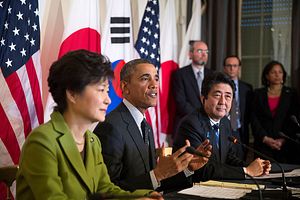Japanese Prime Minister Shinzo Abe and South Korean President Park Geun-hye met on the sidelines of the 70th United Nations General Assembly in New York on Sunday, signaling an improvement in ties ahead of a Northeast Asian trilateral summit between the two of them and Chinese Premier Li Keqiang (or possibly even Chinese President Xi Jinping). Though the meeting wasn’t formal, South Korean presidential spokesperson Min Kyung-wook noted that Park spoke with Abe during a UN working luncheon. Park reportedly told Abe she expected a meeting with him in Seoul.
According to the Japan Times, Abe and Park briefly discussed the upcoming trilateral leaders summit when they met. The trilateral was confirmed shortly after Park attended China’s September 3 parade to commemorate Japan’s defeat in World War II. The South Korean president’s office confirmed that Xi and Park had agreed to hold a “trilateral summit in Korea at a mutually convenient date sometime at the end of October or the beginning of November.”
The last time Park and Abe met for brief informal talks was at Lee Kuan Yew’s funeral earlier this year. Bilateral relations between Japan and South Korea remain cool given historical tensions, including South Korea’s dissatisfaction with Japan’s apologies for the treatment of Korean sex slaves — euphemistically known as “comfort women” — during World War II. The two countries are both important U.S. allies and host several tens of thousands of U.S. troops between them. Both countries additionally are concerned about North Korean belligerence and the country’s nuclear program.
What’s still remarkable is that nearly two years into Abe’s term and two-and-a-half years into Park’s term, Japan and South Korea haven’t held an official bilateral summit. Abe and Park did not meet for the first year Abe was in power; their first official meeting was at the 2014 Nuclear Security Summit in The Hague, with U.S. President Barack Obama included.
Japanese sources have been reporting that Abe and Park will meet officially on the sidelines of the upcoming trilateral. Park’s statement that she expects to meet Abe indicates that the bilateral meeting is still on for now. Earlier this month, Abe’s chief cabinet secretary, Yoshihide Suga, noted that Abe “would be happy to receive an offer” for such a meeting. For Park, initiating a rapprochement with the Abe government via a trilateral is valuable as it is likely to avoid provoking a negative public reaction in South Korea. As the Korea Herald noted earlier this month, the trilateral format “will set the stage for a bilateral summit with Abe in a way that least offends South Koreans.”
Based on the Park-Abe interaction at the UN over the weekend, everything appears to be on track.

































